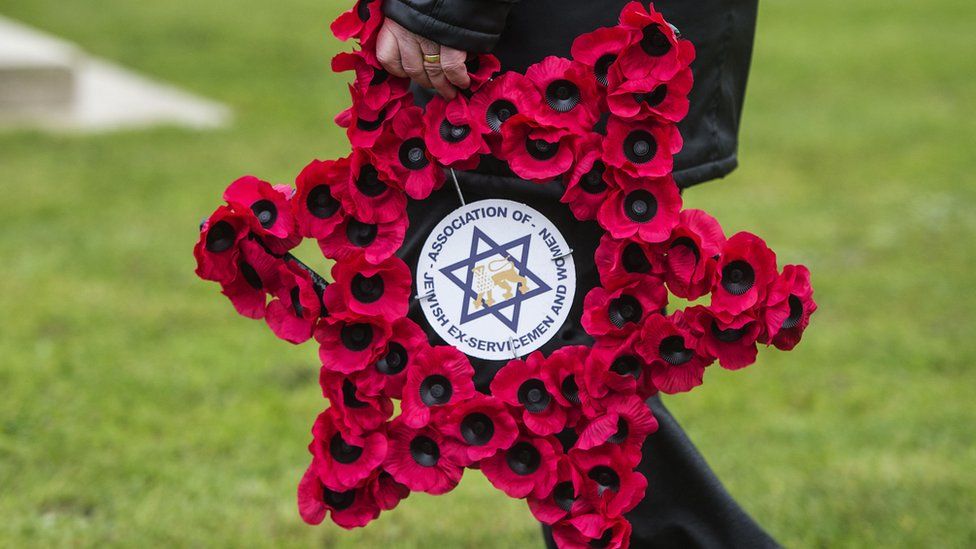Why French Jewish people are moving to London
- Published

Last week, Jewish people around the world remembered the horrors of the past, on Holocaust Memorial Day. But there was also a small reminder of problems in the present.
At London's Liberal Jewish Synagogue, in St John's Wood, a service was held on Friday night to welcome the large numbers of French Jewish people who have moved to the area in recent months.
They have various reasons for leaving their home country: the hope of better economic opportunities, a desire to experience life in a new country, or simply to master their English.
However, many share a concern about the rise of anti-Semitic attacks in their country in recent years.
Perhaps the most high-profile was the hostage crisis at a Jewish supermarket in Paris in the wake of the Charlie Hebdo shootings in January 2015.
The gunman, Amedy Coulibaly, killed four Jewish men before he was shot dead by security forces.
More recently, there have been two separate attacks on Jewish teachers in Marseille by people proclaiming support for the so-called Islamic State group.
It prompted the city's main Jewish leader to advise men against wearing skullcaps, for their own safety.
Family fears
There are no precise figures on French Jewish people moving to London - but, according to Marc Meyer, the French chairman of the Hendon United Synagogue and director of the Conference of European Rabbis, French Jewish children now make up 50% of the intake at London's Jewish schools.
He has noticed a significant increase in families moving to the city in the past year.
About 60 French Jewish people attended Friday's service, delivered in French, Hebrew and English.
The London Liberal Jewish Synagogue says this is just the start of its efforts to try make them welcome, with similar services planned throughout the year.
On the High Street in St John's Wood in north London, I met David.
He moved to the area from Paris 18 months ago with his wife and three teenage children.
From the outset, he is keen to stress the prime motivation to relocate was better economic prospects for his family, yet it is very telling he doesn't want his full name revealed.
And his relaxed and friendly demeanour disappears when he recounts warning his young daughter against carrying a Hebrew book on the Paris Metro.
"If she would have had trouble with people being violent or aggressive with her, she wouldn't have known how to react," he says.
"I wouldn't want her to face that situation."
Disbelief - and resilience
He lets out a long sigh as he recalls the day in March 2012 when he heard about the murder of three Jewish children and their teacher at a school in Toulouse.
They were shot by a French Islamist, Mohammed Mehra.
"It was a shock for everyone because 70 years after World War Two and the Holocaust, you had the impression that, for the first time, you could have troubles in France being a Jew."
The attack made him think of his grandparents who lived in Paris during the Nazi occupation.
He tells me they wouldn't have believed such violence against their religion resurfacing after all this time.
However, you get the impression from speaking to David and other French Jews that any disbelief regarding the resurgence of anti-Semitism is dwarfed by a sense of resilience.
Rabbi Rene Pfertzel, a Parisian who moved to London to study, led the service on Friday.
While the rise in attacks on Jews in France does trouble him, he is adamant it bears little comparison to the suffering of Jews in the past.
"This is not an exile," he tells me, pointing to the vocal support for the Jewish community from the French government.
Sad but not surprised
Instead, he says, his service is an opportunity for French Jewish people to better integrate into the UK.
"I love London, and I love this country," he says.
You get the sense sharing that love and enthusiasm for the UK is much more important to him than dwelling on the reasons why people moved here in the first place.
It's a sentiment matched by Rabbi Sam Taylor, of the Western Marble Arch Synagogue.
Starting in March, he will also be leading a service to accommodate French Jewish people in London.
He says: "Am I surprised about the threats of anti-Semitism? No. Am I saddened? Yes. However, it is part of being a Jew we must accept, but it's important to be positive about what we can do."
David agrees, pointing out Paris is within easy reach should his family ever wish to return.
"It's part of our history and culture to deal with these problems," he says.
"We must look forward and be positive."
For more on this story, listen to The World Tonight on BBC iPlayer.
- Published12 January 2016
- Published18 November 2015
- Published17 February 2015